Peter MALONE
Saturday, 18 September 2021 19:18
Light Physical Injuries

LIGHT PHYSICAL INJURIES
Hungary, 1983, 91 minutes, Colour.
Directed by Gyorgy Sjomjas
Light Physical Injuries is a Hungarian slice of life. It portrays harsh life in the city, human relationships, marriage, divorce, responsibility. The style is realistic and blunt. Of interest as a glimpse of Eastern Bloc life - with its similarities to life in the West.
1. The impact of this contemporary Hungarian film? Social drama?
2. Hungarian industry production values: black and white photography, editing and pace, music?
3. The focus on ordinary people? Audiences identifying with the characters and their situations? Credibly presented? Universal themes: relationships, marriage, divorce?
4. The basic situation of the protagonists: life in the town, the scenes at the bars, ordinary day-to-day violence, the consequences, effect on relationships, housing problems and shortages, subsequent tensions?
5. Csabo - in himself, tough, violent, his experience in prison? The past relationship with Eva and his love for her? The visits and his tenderness? Getting out of prison? Eva divorcing him? His going to live in the same house with Eva and Miklos? His living with that tension? The girl at the cafe, sexual relationship? His creating noise in the house? His devices to spite Eva and Miklos? Their reactions? Anger? Work, hose and the garage? The growing anger, the relationship with the nice girl, fiancee? The police and the harassment at Eva and Miklos' request? The final episode in prison? What future?
6. Eva and her beauty, her way of life in the town, her attractiveness, tenderness? Her visits to Csabo? Leaving him? Settling, no baby, Miklos living in? Inviting Csabo? Reactions? Reporting to the police? Her realisation that she could not stay with him? Her vindictiveness? Her future?
7. Miklos and the relationship, spite, tensions?
8. The girl from the cafe, the contrast with the pleasant girl and the outings?
9. The mother, her comments, pressures?
10. The sketch of the various neighbours? Authentic atmosphere?
11. The analyst and the contribution? The psychological interpretation of social problems?
12. The film seen as the case study -visual, verbal, with commentary?
Published in Movie Reviews
Published in
Movie Reviews
Tagged under
Saturday, 18 September 2021 19:18
Lightning Strikes Twice
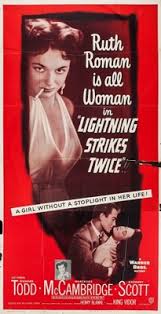
LIGHTNING STRIKES TWICE
US, 1951, 91 minutes, Black and white.
Richard Todd, Ruth Roman, Mercedes Mc Cambridge, Zachary Scott, Darryl Hickman, Frank Conroy, Kathryn Givney.
Directed by King Vidor.
Lightning Strikes Twice is an ordinary, enjoyable murder mystery melodrama of 1950. It is given Warner Bros. production style: music by Max Steiner, direction by King Vidor (The Big Parade, Wilson - and, at this period, Beyond the Forest and the Fountainhead). It is a star vehicle for Richard Todd who had come to prominence in Britain and had performed in The Hasty Heart. Ruth Roman was a regular Warner Bros star as was Zachary Scott. Mercedes Mc Cambridge gives another nervous tension performance. She had just won her Best Supporting Actress Oscar for All The King's Men.
The material is fairly predictable - but presented in the glossy Warner Bros style.
1. Entertaining melodrama? Murder mystery? Thriller?
2. Warner Bros. production values: black and white photography, atmosphere? Light and darkness, shadows? Guilt and innocence? The melodramatic musical score?
3. The work of King Vidor - from silent films to the 1950s, melodramas, heightened dramas, action and characters larger than life? The quality of this film within his work?
4. The title, the credits, storms? Audience expectations about Trev? The irony with the reference to Liza and her second attempt at killing?
5. Romantic melodrama? Murder? Love and fidelity? Betrayal? Murder investigation by Shelley? The melodramatic finale? The car crash? The quick resolution of all plot strands?
6. The focus on Trev: in prison, condemned to death, the visit of the priest and his apology? The flashback from the priest's point of view? Trev's reaction to his wife's death? The re-trial? The juror holding out and splitting the decision? The District Attorney freeing Trev? Shelley and her arrival, information about the murder? Her meeting with Mrs Nolan? The storm and the meeting with Trev? Her involvement in the case, its mystery? Audience sharing the mystery with her?
7. Trev and his background, orphan, brought up by the Nolans, English - education, the marriage to Lorraine, Lorraine's infidelity and evil, Liza and her infatuation, her brother and his infatuation for Lorraine? The farm, Lorraine's death? Trev's behaviour? His seeming guilt? Release, being a recluse? The encounter with Shelley? The sinister aspects of his presence, his being shunned in the town, not willing to see Mrs Nolan? Harvey bringing Shelley to him? The wedding, her fear, Liza's outburst? His rescuing Shelley, his disdain for Harvey? Future happiness?
8. Shelley and her acting background, arrival in the West, the news about the murder, Mrs Nolan and her help with the car, the encounter with Trev, her believing in him coming back to him, falling in love? Her belief, her fear on the canyon? Her encounter with Liza and her brother? Sympathy for them? Relaxation, the encounter with Trev in town, on the canyon? Her decision to leave, the Nolans pressing her to stay? The party? Harvey taking her to Trev? The wedding, her fear on the night, Liza, her rushing to the house, the struggle with Liza, her being rescued?
9. Liza and her running of the ranch, the juror, her seeming friendliness, her concern about her brother, infatuation with Trev? Her outburst against Trev? The confrontation with Shelley, the life-and-death struggle - echoing her story about her killing of Lorraine? Her concern for her crippled brother, his infatuation with Lorraine, Liza's anger? Their struggles? The car crash resolving the problems?
10. Harvey and his wealth, suave, affair with Lorraine, helping Trev, helping Shelley? His being rejected by Trev?
11. The Nolans and their concern, setting up Shelley, the suspicions about J. D. having committed the murder? The reconciliation with Trev?
12. Popular ingredients of romantic melodrama? Murder mystery? The final tying together of strands? The contribution of the priest? Themes of love, fidelity, anger, violence?
Published in Movie Reviews
Published in
Movie Reviews
Tagged under
Saturday, 18 September 2021 19:18
License to Drive
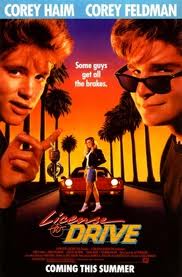
LICENSE TO DRIVE
US, 1988, 88 minutes, Colour.
Corey Haim, Corey Feldman, Carol Kane, Richard Masur, Heather Graham, Nina Siemaszko.
Directed by Greg Beeman.
License to Drive is a teenagers' film. Young Corey Haim has dreams of getting his licence and the freedom that will follow. He fails the test, but takes Grandfather's car for a night on the town with literally smashing results. A very good cast which includes Carol Kane and Richard Masur as his parents and Corey Feldman as his friend does its best with this nightmare comedy - but it is too fanciful and is certainly not the best ad for safe driving.
1. Teenage fantasy? Impact on teenage audience? Adults? Americans?
2. The locations in the city, school, city at night? Cars, special effects and stunts? Musical score?
3. The title, the licence for freedom? The farcical aspects of the film? Serious?
4. Les and the opening dream, the macho fantasy? The reality in his family, twin sister? His friendship with Dean and Charles, their urging him on? The attraction towards Mercedes, her presence in his dream, offering the date? Relationship with his parents, brother and sister? His going out, leaving his father on the side of the road and taking Mercedes how? The nightmare of the test, his almost reprieve, the failure? The reaction of the family, friends? At night at home, the phone call to Mercedes, the decision to take the car, the globe, the lawn, not willing to park the car, then getting, it towed away, paying out the money to get the car back, Mercedes and her dancing with her shoes on the car, her being sick, on the lookout over Los Angeles, encountering the police, the drunk and his taking the car, the elaborate chase, crash, rivalry with the gang, at the diner, the protest march, eventually getting home? His mother and her pregnancy? Having to reverse all the way to the hospital, Grandfather coming home and crashing the other car?
5.. Mercedes, the girl of Les' dreams, fight with her boyfriend, the glamour, going out, rivalry, being sick, dancing, in the trunk of the car, the happy ending?
6. Dean and Charles: school the licence, types, urging Les on, sharing the night, the photography and the dangerous driving? Jokes and irresponsibility?
7. Parents and their relating to Les, discipline at home, letting him go out, his father and the buying of the car, his mother and her pregnancy, sleeping through the night with the car absent, getting up to get the car ready? The discovery? Going to the hospital?
8. The test, the fierce lady, his sister getting through the test easily, the black supervisor and the cup of coffee - and later passing him?
9. His sister, the socialist boyfriend, the demonstration?
10. Enjoyable teen comedy? The image of teenager-s? The serious and the comic?
Published in Movie Reviews
Published in
Movie Reviews
Tagged under
Saturday, 18 September 2021 19:18
Leviathan
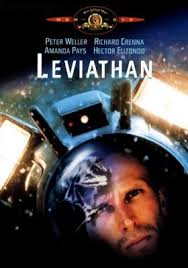
LEVIATHAN
US, 1989, 98 minutes, Colour.
Peter Weller, Richard Crenna, Amanda Pays, Daniel Stern, Ernie Hudson, Hector Elizondo, Meg Foster.
Directed by George Pan Cosmatos.
Leviathan is the mythological name of a sea monster. This time it is a sunken Russian ship which wreaks havoc on Americans in a mining ship several kilometres down in the ocean.
The film's screenplay is reminiscent of Alien, the adaptation of an old horror story to a science fiction technological future. The members of a mining ship are threatened by a mysterious virus which becomes a monster and devours them in turn. The callous authorities on the surface avoid responsibility. It is up to hero and heroine to succeed.
This is familiar material - and lacks the flair of such films as Aliens. While the wide-screen photography and the technological details are impressive, the cast lacks something of the screen presence of a heroine like Sigourney Weaver.
The film is directed by George Pan Cosmatos, maker of such thrillers as Escape to Athena, The Cassandra Crossing, Rambo II and Cobra.
1. Interesting and entertaining horror monster story?
2. Panavision photography, underwater, the shaft, the sea and the mining, the developments in technology, computers, communication, destruction?
3. The special effects, atmosphere of horror, the monster, the humans? Stunt work?
4. The title: mythology, the Russian ship, the submarine, the disease, plague, the experiments gone wrong?
5. Themes and comments on nature and science, possibilities, conforming to nature or destructing? The experiments to produce homo aquaticus?
6. The set-up with the company, the mining for silver, the depths of the sea, safety, money, the turn of 90 days, the quota required, the details of work, machinery, the suits, the return to the shaft? The initial crisis with De Jesus, Doe's absence? Signalling of dangers? Beck as boss (and checking books about being in charge)? The unions and stances?
7. The interaction of the group, likes and dislikes, pressures? Interests, the end of term, the clash? Six-pack and his scare? Beck and trying to be in charge? Martin at the service and her television communications, commands, abrupt turning off?
8. The situation and the group in the ship, Six-pack and his going off by himself, discovering the Leviathan, taking what he found, Williams following him,, the plunder and the video information, the vodka and the party? The genetic alteration? Bowman and the vodka, her discovering her illness, her killing herself? Communication with Martin, the news of the hurricane? The two dead bodies, deciding the get them out of the ship? Cobb scratched, the limb cut off? The pursuit of the remaining Victims, their strategies? Cobb going, Doe and his message, his death? De Jesus and his being destroyed? The others having to cope, plans, destruction, the danger and the escape? The surface and the irony of there not being a hurricane? The pursuit of the sharks, the sudden appearance of the monster and Beck destroying him?
9. Characters: Beck, geological background, in charge, helping De Jesus back into the-shaft, Doe's absence, Six-pack and his cheek, his going into the boat, return, the vodka, his death and keeping it quiet, Bowman and her illness and death? Strategies, interactions with Martin, leading the group, destroying the monster, surviving?
10. Bowman, her work, interest in money, tough, the vodka, her horror, killing herself?
11. Six-pack as loud, vulgar, with the women, with Williams, going to the Leviathan, stealing the vodka, the horror of his death?
12. Cobb as the union man, his help, being scratched, ultimately destroyed?
13. De Jesus, the crisis, recovering, objective about the deaths, the jigsaw puzzle, his being consumed by the monster?
14. Doe and his absence, clever, his background, his concern about the illness, computer information, help, being caught, sending the desperate message to save the world?
15. Williams and the mining, jogging, training for space, clashes with Six-pack, the creature in his bed, the terror, getting to safety?
16. Martin and her executive style, smooth and callous, the discovery of the death list, her welcoming them aboard - and the audience responding to Beck's chauvinist or non-chauvinist, punching of her?
17. The visualising of the monster, its gradual mutation and absorbing the characters?
18. The tradition of alien horror?
Published in Movie Reviews
Published in
Movie Reviews
Tagged under
Saturday, 18 September 2021 19:18
Letter to Three Wives, A
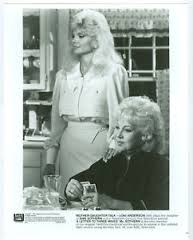
A LETTER TO THREE WIVES
US, 1985, 100 minutes, Colour.
Loni Anderson, Ben Gazzara, Michelle Lee, Stephanie Zimbalist, Charles Frank, Michael Gross, Doris Roberts, Ann Sothern.
Directed by Larry Elikann.
A Letter to Three Wives is a telemovie remake of Joseph L. Mankiewicz's Oscar-winning classic of 1949. As with so many remakes, it seems rather unnecessary given the strength of the original. However, this is a pleasant remake, colourfully filmed in Vancouver and British Colombia.
This version follows the original screenplay very closely. The main characters are all kept, so is a great deal of the dialogue. Loni Anderson and Ben Gazzara take the place of Linda Darnell and Paul Douglas from the original. Ann Sothern appears as Loni Anderson's mother in this version. She was in the original, her part being played here by Michelle Lee. The Jeanne Crain part is played by Stephanie Zimbalist. The parts played by Kirk Douglas and Jeffrey Lynn are played by Charles Prank and Michael Gross. There is a good supporting role by Doris Roberts as Sadie.
The film is updated to the '80s. However, the basic story of Rita and George and Laura Mae and Porter remain very much the same. In the '40s version Rita and George were involved with radio. Here they are involved, of course, with television. There is some satire in the dialogue about television.
The performances are quite good, especially Michelle Lee. Loni Anderson is surprisingly persuasive in her role of Laura Mae.
The issues raised are still the same as those of the original - and in the same way.
Published in Movie Reviews
Published in
Movie Reviews
Tagged under
Saturday, 18 September 2021 19:18
Letters from Three Lovers

LETTERS FROM THREE LOVERS
US, 1973, 74 minutes, Colour.
Barry Sullivan, June Allyson, Ken Berry, Martin Sheen, Belinda Montgomery, Robert Sterling.
Directed by John Erman.
Letters from Three Lovers is a brief engaging telemovie. In 1972 a telemovie, The Letters, was produced as a compendium of three short stories all focusing on letters delayed a year in delivery. As the commentators said, 'Success means a reprise' (Leslie Halliwell) and this is it.
The film is very reminiscent of television series and works at that level popular and predictable material, nonetheless enjoyable. The film has quite a strong cast. Director John Erman directed a number of telemovies during the '70s and '80s.
1. The popularity of this kind of material - short story, soap opera elements, popular TV series elements and treatment? A style of entertainment popular because of television styles and audiences?
2. Glossy presentation? Colour photography, locations? General atmosphere of affluence? The musical score? The inter-editing of the three stories? The device of the postman explaining the situation to the audience, the establishing of the three stories, getting the letters on their way, the postman delivering each of them, his final comment? An effective device - or distracting? The holding of the solutions until the end?
3. The tone of the title-and indication of themes? Audience expectations of happy endings - fulfilled, dashed?
4. The first story: Dear Vincent. Martin Sheen's portrait of a young no-hoper - out of work, in love with Angela, going to see her in the cafe, his not being able to pay his bills, his wanting to buy the garage but not having the money, his hopeless prospects for employment? Angela's support? Her wanting to get married? The man at the bar and the robbery, calling him a fool? His imprisonment? Bitterness, hostile reaction to Angela? The support from the cellmate? His wanting Angela to write to him? The effect of the visit on her, seeming to fail? Her writing the letter - and its delay? The release from jail, tracking Angela down, the set-up for driving the getaway car, his receiving the letter and wanting to get out of it? His being taken at gunpoint? Ringing Angela, her joy in hearing him, the criminal's thinking that he was ringing the police and shooting him? The dramatic effect of Angela's voice coming through the phone as it dangled, Vincent dead clutching the letter - only a letter? The credibility of this kind of story? Its brevity? Humanity?
5. The second story: Dear Monica. The pleasure of seeing June Allyson and Barry Sullivan and Robert Sterling? Monica and her relationship to Joshua, the tension, her memory of her dead child, Joshua's being always busy? Monica's going out, the mistake in the restaurant, the encounter with Bob? Her susceptibility - the meal, his charm, the dancing, talking, the night together? Her wanting to continue the affair? Bob and his response to Monica? The mistakes and the letter not being sent? Monica's going to the hotel, her waiting, her disappointment? Her withdrawing for a year? Joshua's offer for, adopting a child? The arrival of the letter, Monica's going to the hotel, her wanting the night to be repeated - and its being impossible? Her leaving? The reconciliation with Joshua? Soap opera material - credible, enjoyable?
6. The third story: Dear Maggie. The establishment of Maggie as a working girl, wanting to be married, reserved? The irony of her going to Palm Beach, her boss leaving, her appearing to be wealthy, buying the Jewels, not telling the truth, the hero and his wanting to marry a rich-girl, his putting on the charm - and making a mistake by the poolside? His falling in love with Maggie, his running away? The letter and its delay? The arrival, Maggie wanting to meet him, their encounter in the lift - telling the truth and the happy ending?
7. The moralising of the policeman - the importance of letters, communication, accidents (how credible was the plane crash and the rescue of the mailbag?), audience response to basic and predictable emotions?
Published in Movie Reviews
Published in
Movie Reviews
Tagged under
Saturday, 18 September 2021 19:18
Lies
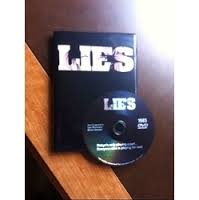
LIES
US, 1983, 100 minutes, Colour.
Ann Dusenberry, Gail Strickland, Bruce Davison, Clu Gulager.
Directed by Ken Wheat, Jim Wheat.
Lies is an entertaining and. intriguing American gothic horror film of the early '80s - which also received good reviews from the critics. It plays with the clash between fantasy and reality - especially via cinema images.
The film also has a very good cast led by Anne Dusenbury with Gail Strickland particularly strong as the villainess. The film has echoes of many of the massacre horror stories of the '70s and '80s - but then moves to the stand-by of the mental hospital. (Echoes of One Flew Over The Cuckoo's Nest.)
Well-made and entertaining of its kind.
1. Impact as a thriller, mystery? Fantasy and reality, truth and falsity? Especially via cinema images?
2. A blend of exploitation and gory thriller with popular thriller? The dialogue giving a critique of the exploitation films?
3. A piece of Americana, atmosphere, contemporary, the massacre and horror movies, the film industry and its exploitation, mental institutions and their treatment of patients, the affluent world of society? Sex and violence? Mayhem? Truth and lies?
4. The focus on Robyn - her work in the horror film, her refusal of nudity. her clash with her agent, the relationship with Eric, her going to the film test? The young hopefuls and her being chosen by Jessica, the interview and giving a good account of herself? The plausibility of the film story? Her signing the contract, going with Jessica to the homie? Reading, acting? Being filmed on video? The tour of the asylum? The upset when the film was abandoned? Her wanting to go back home - Eric with another woman? The encounter with Stuart, believing his story, being seduced by him? her agreeing to pose as his sister - the set-up, the discovery of
the truth, the murder? Her being imprisoned in the mental hospital? Desperation, her manoeuvring of Jessica, deceiving her about the pills, the fight with the nurse, the escape? Her being watched? Sedated and shock treatment? The escape with Dr. Bartlett, the rescue by Eric? The violent ending? A girl sure of herself - but made a victim?
5. The prologue and its ugliness, Stuart and his presence at the massacre, his taking photos of Robyn? His revealing his truth, the seduction, sequel encounter, Robyn consenting to pose as his sister, the greetings of the uncle and aunt, the trap, the death, the use of the video? Stuart's ruthlessness, his pressures on Jessica and Dr Bartlett, his arrival, the escape, the shooting, being killed by Dr Bartlett?
6. Jessica and her toughness, her professional life, the interview, the acting and the videotaping, the tour of the hospital? Her hold on Dr Bartlett? her lack of scruple? The greedy doctor and his murder? Dr Bartlett's plea for her to relent? Her being tough to the end? Dr Bartlett and his compliance, changing motivation, playing his part, with-Jessica, relenting, helping Robyn, his being shot, driving the car at Stuart?
7. Eric as a writer, relationship with Robyn, the other girl? The phone call, getting Murray's help? His anger in the hospital, the arrest, his return, disguised as a security guard, helping Robyn with the escape? The tensions in the escape in the hospital corridors? Murray and his help, his limp, tricks to help them escape, trouble with his car?
8. The greedy doctor - a possible helper, his blackmailing Jessica and D Bartlett, being trapped in the lift, his being hanged?
9. The staff at the hospital, the screaming patient when Robyn was hiding in her room? Horror touches? The set-up for the filming - and its being persuasive acting? The real Elizabeth, her death in the house - with the uncle and aunt at witnesses?
10. The complexities of the plot, the web and tissue of lies?
11. A thriller and its satisfying edginess? Themes of greed, cruelty, ruthlessness and power? Yet the expected heroism?
Published in Movie Reviews
Published in
Movie Reviews
Tagged under
Saturday, 18 September 2021 19:18
Letters from Marusia
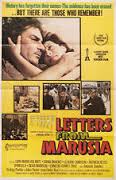
LETTERS FROM MARUSIA
Chile, 1976, 110 minutes, Colour.
Directed by Miguel Littin.
Letters From Marusia is a very strong Chilean film from the mid-70s. It was in competition in Cannes in 1976 and was nominated for an Oscar for best foreign film.
The film is the work of director Miguel Littin, who has worked continuously in the Chilean film industry from the mid-60s to 2005. His Alsino and the Condor from 1982 was widely released internationally.
The film goes back to the late 19th century-early 20th century to the mines for saltpetre in Chile. It takes up the cause of the miners and their attempts to form unions against the strong opposition of the mine owners. The film shows the grim struggle, the hardships in the mines and the effect for the lives as well as the deaths of the miners.
1. The dramatic impact of the film? Its production qualities? Latin American audience? Universal audience? Social criticism of the '70s?
2. Mexican production: big budget, lavish? Oscar nomination? A film for Chile in the '70s - and for the world to understand the situation in Chile?
3. The atmosphere of Marusia: the mines, the mountains and the barrenness, the dust, the town, the trains, the buildings? Poverty? The contrast with the towns by the sea? The colour photography, the spectacle, crowd sequences, special effects? The atmosphere of Mikis Theodorakis' score?
4. The editing and structure - the focus on Marusia, the people, the crises? The human interest and feeling of the flashbacks? The cumulative effect of the drama and the confrontation?
5. The situation in Chile in 1907? Images of Chile: government, military, the schools, the companies, the workers, the camps, the strikes, the oppression, resistance, massacres? The '70s and the continuous struggle as illustrated by the early 20th. century?
6. Gregorio: his presence, the mystery, the monologue, as a character, his mission, achievement? The flashbacks: the death of his wife, torture, death? As a man in Marusia? The massacres, feeling? His authority, plans, strategies? Skill? Relationships? His talk to the people? Louisa? The opposition? His being taken, torture? Death? His character? Human dignity?
7. Solo and the others: work, the slums, experience, attack, dynamite, the shooting, the suffering? Portrait of Individuals?
8. The men and the massacres - so many? The picture of the men gone mad with sulphate poisoning? Their stalking the military? Their participation in the disaster? Madness, the train, the battles? The visuals of violence and death?
9. The women: Louisa and the children, the memories of Iquique, support, the whispering sequences, the women lying down on the railway track, their being killed? The applause and the hissing?
10. The children in such a town, L6uisals care, their being used?
11. The portrait of the military: the ordinary soldiers, obedience, shooting the miners? The military chiefs - and the mistake in the killing? The cover-up? The retreat? The train and the massacres of the women?
12. The continued theme of violence, torture? The strong visual impact for the emotional response to the themes?
13. The strength of the individual stories - but subordinate to the social themes?
14. The issues of the Third World: poverty, oppression, violence, revolution?
Published in Movie Reviews
Published in
Movie Reviews
Tagged under
Saturday, 18 September 2021 19:18
Letters from Frank
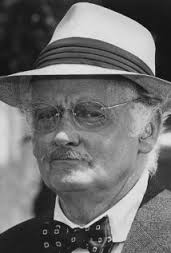
LETTERS FROM FRANK
US, 1979, 100 minutes, Colour.
Art Carney, Lew Ayres, Michael J. Fox, Mike Farrell, Margaret Hamilton, Maureen Stapleton.
Directed by Edward Parone.
Letters From Frank is an excellent telemovie. Art Carney portrays a man who has worked at his job for 40 years, has to leave, goes into retirement but cannot settle. He writes letters to his estranged son as to his former employer. His retirement gives him the chance to meet his brother, offer something to his wife Betty, go on the road to see their grandson.
The film focuses on the theme of old age and retirement very well, showing the frustrations of the active man, the dreams of the woman who has been a devoted wife and mother but has not been able to live for herself. It also shows the contemporary broken marriage, the bitter ex-wife, the irresponsible son who has been spoilt by his father and wants to achieve for himself. It also focuses on the grandson in the broken family situation.
Besides Art Carney, the cast is excellent and includes a sympathetic performance from Maureen Stapleton, a very spirited performance from Margaret Hamilton as Frank's mother, a vigorous lady about 90 (Margaret Hamilton was the Wicked Witch of the West in The Wizard of Oz). Mike Farrell is persuasive as the son, Gail Strickland as the daughter-in-law and a young Michael J. Fox is the grandson. Lew Ayres has a guest role as Frank's brother.
The film tells a humane story that audiences can identify with as well as reflect on.
1. An interesting story? Characters? Situation? Themes of work, retirement, age? Family?
2. The telemovie style, a piece of Americana, for the home audience?
3. The strength of the writing of the characters, Frank - Is letters and voice-over, the truth of the situations, their impact?
4. Art Carney's portrait of Frank: his 40 years experience at work, the paymaster, friendship with employees, having to retire, loving, crusty? His relationship with his wife? The estrangement of his son? His job and packing, packing up from the family apartment? Betty and her hopes for the retirement? On the road? Retirement and the fulfilment of dreams? Taking Adele - and her vitality, strong philosophy of life, enjoying the human comedy? The new house and Betty's hopes? Frank's wariness? Dan and his wife, their welcome? The unpacking,
settling in? The contrast with Dan and his not wanting to do anything? Going fishing, Dan's attack and death? The impact of the funeral on Frank? His letter to Mr Carstairs? His complaints about retirement? Buying the car, the dog, the anger at the prowler? Being upset? The decision to return - and his not understanding Betty's point of view? His job, interviewing the older people, especially the man who was over
70 but wanted to be janitor? The difference of opinion with Carstairs and his leaving? On the road again, the visit to Ricky and Marlene? Missing their Christmas visit? Sharing with Ricky? Marlene's situation? Taking Ricky on a visit to his father, concealing him in the car? The impact of the visit to Richard? Questioning him, finding out the truth? About the painting, about his work, about his control of his son, dreams for his son? Betty's telling him the truth? His realisations, the admissions in hit final letter? His future? A strong
portrait?
5. Betty and her love for her husband, ordinary housewife and mother, the apartment, her own dreams of being a nurse not being fulfilled, not wanting to be on the move, looking forward to the retirement, enjoying the house? Her upset at having to go back to the city? The support of Adele? Her reaction to Frank's wanting to go on the road again? The visit to Marlene and Ricky, the sympathy towards Marlene? Her appraisal of Richard? Telling the truth to Frank about their son?
6. Adele and her vitality, smart talk, her influence on her son - especially about the vitality of life and watching the human comedy?
7. Marlene and her experience, bitterness, knowing the truth about Richard? Her love for her son, his feeling left out? Her job, wanting to marry?
8. Ricky and his age, experience, resentful of his parents? Boasting about his freedom? Watching the match with Frank, talking with him? The visit to his father, needing his father? His reticence - but the response to parental love?
9. Richard and his isolating himself from his parents, his marriage, treatment of Marlene, of Ricky, remarrying? His immaturity? His father's dreams for him, control? His wanting to break out, do his own work? Themes of success, his father's permission to do things? Not being ready to cope with Ricky? His future?
10. The sketch of Dan and the comparison with Frank, retirement, sitting and enjoying life, the fishing, his heart attack and death?
11. Themes of work, family and home? Age and retirement? Re-assessing and repairing relationships?
Published in Movie Reviews
Published in
Movie Reviews
Tagged under
Saturday, 18 September 2021 19:18
Legal Eagles
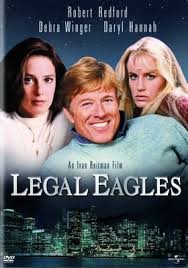
LEGAL EAGLES
US, 1986, 116 minutes, Colour.
Robert Redford, Debra Winger, Daryl Hannah, Terence Stamp, Brian Dennehy, Christine Baranski, Roscoe Lee Browne.
Directed by Ivan Reitman.
Legal Eagles is a pleasant romantic, screwball comedy of the '80s - with the touch of the thriller and the court drama. It is interesting in its attempt at reversal of roles (though Robert Redford still seems to be the hero). His Tom Logan has all the pratfalls and the nervousness. Debra Winger, on the whole, appears as the self-assured lawyer. Daryl Hannah is, as often in her films, an ambiguous character of good and evil. There is a very strong supporting cast with a good role again for Brian Dennehy as well as for Terence Stamp.
The film was meant to echo the partnerships of the stars of the '30s and '40s like Cary Grant and Katharine Hepburn, Spencer Tracy and Katharine Hepburn. The pairing of Redford and Winger does not quite have this same effect.
Direction is by Ivan Reitman who worked with the Saturday Night Live cast members like John Belushi and Bill Murray. His most successful film was Ghostbusters. The musical score is by Elmer Bernstein.
1. Pleasing comedy? Drama? Battle of the sexes? Background of crime, courts, law? Enjoyable and satisfying blend?
2. The use of New York City, its look, buildings, apartments, galleries? Style? The '80s? The pace of the comedy and the thriller sequences? Musical score and songs? A contemporary and chic look?
3. The songs, love touch? The creative art with 'Put Out The Fire' composed and sung by Daryl Hannah?
4. The title? The focus on law, performance, ideas and ideals, clash, careers? Collaboration?
5. New York, 1968? Chelsea, her relationship, with her father, her age, the party, her seeing the personalities? The painting, the initials? The role of Taft and Forrester? Seeing the killing? Setting the tone?
6. The introduction to Tom Logan: Robert Redford, presence, appearance, style? At work, wife, Jennifer - and her comments on his behaviour and attitudes (and echoes of Kramer vs Kramer)? D.A., the bosses etc.? The initial encounter with Laura, her insistence? Speech and interruptions? The case and Chelsea? Being followed? The questions about the case and Laura's insistence? Their working together, the leads, the interview with Forrester and the questions about the painting? Taft and his warehouse? The encounter with Cavanaugh? Police help? The information about Brock? The visit to Taft's warehouse and the explosion? The search for the truth? Logan and Laura working together, their sparring, the battle of the sexes? The further deaths? Chelsea's role? Her art? The confidence trick about the insurance? Chelsea, the night with Logan, the repercussions and publicity? Taft's death and Chelsea's presence? Forrester's death? The cars in the street and the crashes? The continued work with Laura, the case, the evidence? The gallery and the fire, the rescue? The struggle with Cavanaugh and the truth? The questions about Logan's further career, D.A. - and his working with Laura?
7. Laura and her reputation, Debra Winger's presence and style? The strong professional woman? The court case, the protest, her working for Chelsea? Gathering the evidence, the neatness and efficiency of her work? Contact with Cavanaugh? Interrogation of Forrester, Taft? Searching for the files, the explosion in the warehouse? Her reaction towards Chelsea and Chelsea's relationship with Logan? The deaths, the partnership? The build-up to the gallery fire? The future with Logan?
8. Chelsea and her background, the deaths, the arrest, her personality, revenge? Taft and Forrester and the lies? Her skill as a performing artist, 'Put Out The Fire', its impact? The night with Logan and the notoriety? The deaths of Taft and Forrester? The information, the revenge, the final rescue?
9. Cavanaugh and the police, his information, the files, help? His continued turning up? The irony about Brock? His engineering everything? The confrontation in the gallery, the fire and his death?
10. Forrester and Taft, their status in society, conspiracy, smooth style, criminal deals, their deaths?
11. The spectacular effects - especially as regards fires in the warehouse and in the gallery?
12. The courtroom sequences, the to-ing and fro-ing of the cases? Lawyers, the judge? The enjoyment of court sequences? The presentation of the police and authorities and their attitudes towards Logan and Laura?
13. The background of domestic relationships, family, sparring?
14. An enjoyable blend of the battle of the sexes, the mystery thriller, courtroom drama?
Published in Movie Reviews
Published in
Movie Reviews
Tagged under